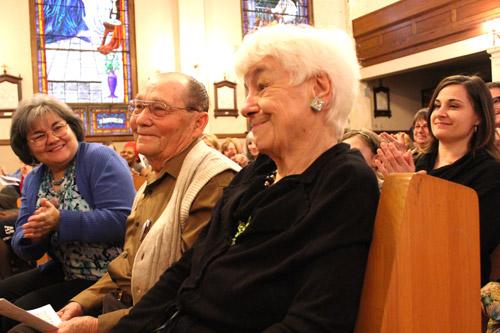
As the 80 attending the first St. Joseph’s Feast Day Mass celebrated at St. Joseph Center March 18 filed out of the chapel, a handful of congregants stayed behind.
It’s not a large space, but the look in many of their eyes was miles away, squaring the here-and-now against long-ago memories of the large stained glass windows, white marble altar and stately woodworking.
But the tone of the event, held on the eve of St. Joseph’s feast day, had far more to do with where the 104-year-old former North Little Rock orphanage is going even as it paid to homage to where it has been.
“St. Joseph (Center) is venturing upon a new frontier,” Father L. Warren Harvey, pastor of Our Lady of Good Counsel Church in Little Rock, said in his homily. “This place … has meant so much to so many people that it would be a crying shame to watch it deteriorate into oblivion.
The new frontier Father Harvey referenced — and to which the center owes the enthusiasm radiating through the hallways — is the impending dawn of the first growing season of St. Joseph Farm, which became a tenant partner of St. Joseph Center last fall.
St. Joseph Farm will support a number of agricultural initiatives on the grounds, including community gardening, teaching organic and sustainable farming practices and practicing social justice.
“(The center) is returning to its roots as a center for agriculture, art and education,” said Sandy DeCoursey, chairman of the non-profit St. Joseph Center of Arkansas Inc. “We’re very excited to be utilizing almost the whole building and all 63 acres to not only produce food, but also help feed the hungry.
During Mass, Father Harvey acknowledged Julius Greb, a caretaker there for 59 years, as an integral part of St. Joseph Center’s history. He also recognized Benedictine sisters from St. Scholastica Monastery in Fort Smith who formerly operated St. Joseph Orphanage.
For their part, the sisters announced after Mass a joint agreement with St. Joseph Center to create a museum and records repository. Displays and artifacts will tell the story of the nuns’ tenure running the orphanage starting around 1910, a day care from 1978 to 1997 and finally serving as caretakers when it was a retreat center until 2007. The project will also create a confidential database of all children and elders who lived, attended school or were otherwise served by the facilities’ ministries.
DeCoursey said while St. John Center is no longer directly affiliated with any one denomination, the presence of the museum will serve as a reminder to future generations where its roots lie.
“This is an ecumenical-based facility, welcoming to all, just like the sisters did when it was an orphanage, but we also want to be true to our Catholic heritage,” she said. “These are very hallowed grounds and we as the Catholic community in Arkansas need to rally and make sure that it continues to do God’s work moving into the future.”
The future of the center got a lot brighter with the founding of St. Joseph Farm. Katie Kilpatrick, farm manager, detailed the progress the group has already made, including signing up 10 partner farmers from the Arkansas Delta. These producers are transitioning to organic techniques, trained via St. Joseph Farm workshops and also receive help marketing their crops. For starters, this includes 150 farm shareholders, each of whom paid a seasonal fee to receive a weekly basket of vegetables grown by the partners.
“One of our social missions at St. Joseph Farm is to help any farmer become organic and especially Delta farmers because they don’t have a very good base of organic farming consumers,” Kilpatrick said. “We can expand their customer base significantly.”
Heifer International is partnering with the effort this year, which Kilpatrick said is crucial not only to sustain the momentum the venture has generated, but to parlay that excitement into growth.
A significant portion of the food grown will be distributed free to the hungry in the community. Kilpatrick said some of the produce raised will be sold from an on-premises farmstand, open to the public and staffed in part by the four college interns St. Joseph Farm is in the process of recruiting.
“We’re also having a pilot mobile market,” Kilpatrick said. “Whole Hog Café has donated their competition barbecue trailer and we’re going to … take it into underserved communities which don’t have access to fresh, healthy food.”
Father Harvey said some of his earliest memories included taking school field trips to the orphanage and the prospect of the place still impacting people’s lives by feeding the hungry and teaching self-sufficiency makes him very hopeful for its future.
“I’m a country boy, number one, so I love gardening,” Father Harvey said. “I feel great every time I come out here. It’s a feeling of holy ground. It can now become what God wants it to be.”
Please read our Comments Policy before posting.
Article comments powered by Disqus Don’t let misconceptions cause faith to waver
Don’t let misconceptions cause faith to waver
 Seniors, whatever storms may come, Jesus will be there
Seniors, whatever storms may come, Jesus will be there
 Studio 3:16 offers new approach to teaching religion
Studio 3:16 offers new approach to teaching religion
 After three decades, NLR principal plans to retire
After three decades, NLR principal plans to retire
 CHS athlete overcomes odds to reach collegiate goal
CHS athlete overcomes odds to reach collegiate goal
 St. Joseph a model of solidarity with immigrants
St. Joseph a model of solidarity with immigrants
 Two gifts after Jesus’ death: Virgin Mary and Eucharist
Two gifts after Jesus’ death: Virgin Mary and Eucharist
 Why we have an altar, and not just a communion table
Why we have an altar, and not just a communion table
 Pope: Wars should be resolved through nonviolence
Pope: Wars should be resolved through nonviolence
 Living relationship with Jesus Christ in the Eucharist
Living relationship with Jesus Christ in the Eucharist